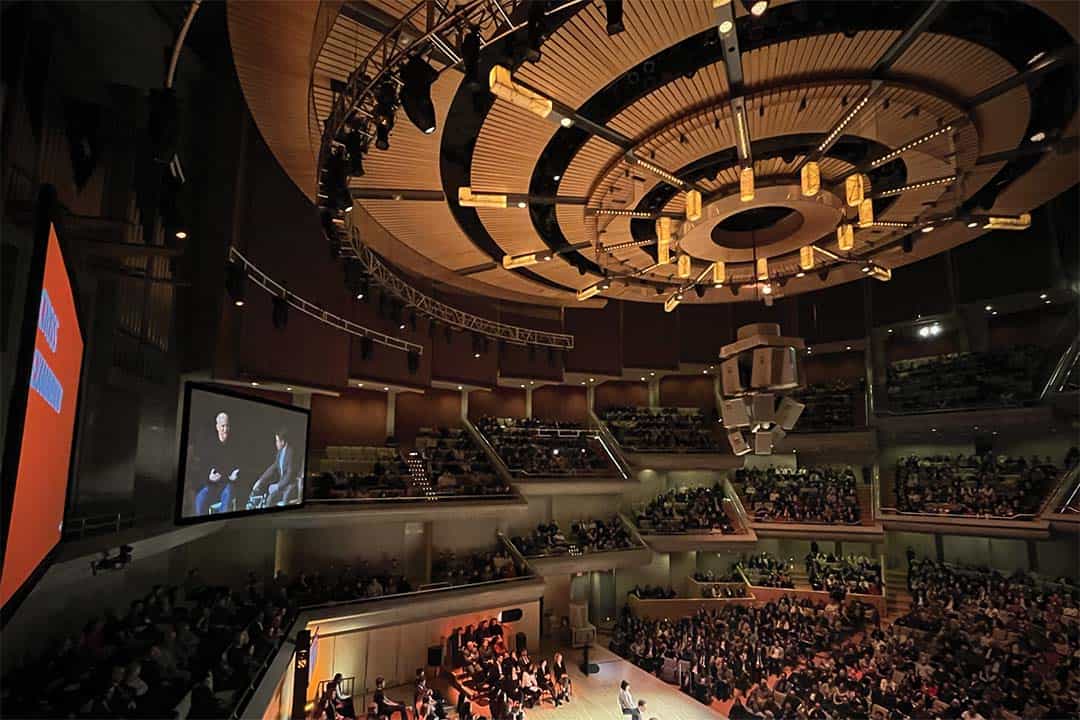On November 30, the Munk Debates hosted its biannual debate at Roy Thomson Hall. The motion of the debate was, “Be it resolved, don’t trust mainstream media.” On the PRO side were Douglas Murray and Matt Taibbi, and on the CON side, arguing against the motion, were Malcolm Gladwell and Michelle Goldberg.
The Munk Debates are held twice a year in Toronto. According to its website, the series aims to provide a platform for leading thinkers to engage in “civil and substantive public debate” about “the big issues of the day.” It was established by Peter and Melanie Munk, the philanthropists who also named U of T’s Munk School of Global Affairs and Public Policy.
At the start of the night, organizers polled the audience and found that audience members were almost evenly split about the motion. But by the end of the event, 67 per cent agreed with the PRO-side debaters, the largest vote gain to have ever been recorded at a Munk Debate.
The debaters
Among those who argued that the mainstream media should not be trusted was Murray, a bestselling author and associate editor for the UK-based weekly magazine The Spectator. Many have accused Murray of xenophobia, particularly in connection to his books attesting that the demographic changes in European countries spell the death of “Western values.” Alongside him was Taibbi, an award-winning investigative reporter and former contributing editor for the Rolling Stone.
Gladwell, a globally recognized New Yorker writer and bestselling author, and Goldberg, an op-ed columnist for The New York Times, argued against the motion. Gladwell and Goldberg previously spoke at Munk Debates in 2015 and 2018, respectively.
The debate
Taibbi started the debate with a personal story. “I grew up in the press,” he said. “My father was a reporter, my stepmother was a reporter, my godparents were reporters.” He said that, despite his intimate connection with the journalism industry, he believes that the industry has “destroyed itself” because each outlet only speaks to one specific political demographic.
Murray supported Taibbi’s argument and pointed to large Canadian media outlets’ coverage of the trucker convoy protests as an example. “Your prime minister decided in advance that these [protesters] were defeated all along,” he said. “Now, what would mainstream media do at such a time? It would question [this narrative]. The Canadian mainstream media did not.” In that case, Murray argued, the Canadian mainstream media acted as an arm of the government.
Meanwhile, Gladwell and Goldberg referred to large media outlets such as The Washington Post and The New York Times to argue that the profession of journalism has consistently been rooted in integrity and in finding all sides to stories, wherever it may lead the journalist.
Even though the speakers often said that they wanted to broaden the scope of the debate beyond the United States, their examples often revolved around American issues and events.
Before the debate, 52 per cent of audience members voted that mainstream media should be trusted; after the debate, this number dwindled down to 33 per cent.
Previous debates
Previous Munk Debate issues include whether the capitalist system is broken, whether Western countries should assist refugees, and whether religion is a force for good in the world.
Previous debaters at the Munk Debates include public intellectuals such as Stephen Fry and Alain de Botton, as well as controversial figures such as Henry Kissinger, Laura Ingraham, and Jordan Peterson.
In 2018, hundreds of protesters gathered outside Roy Thomson Hall to demonstrate against the Munk Debate because Steve Bannon was set to speak. Bannon was a White House chief strategist under Donald Trump and has espoused white nationalist views. Police ultimately beat demonstrators with batons, pepper sprayed the crowd, and arrested some protesters.


